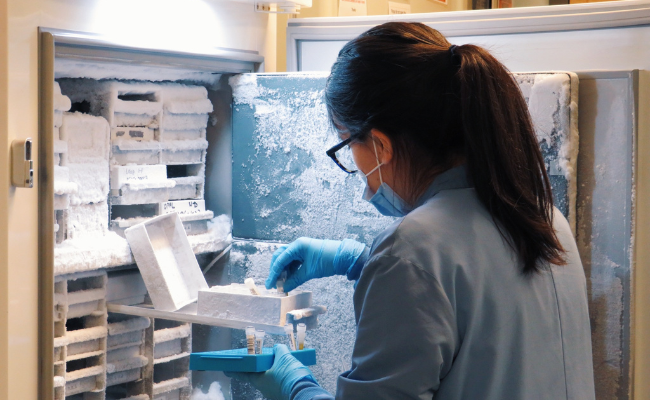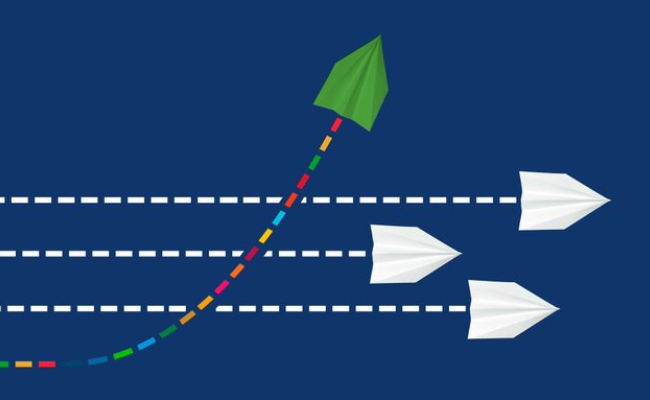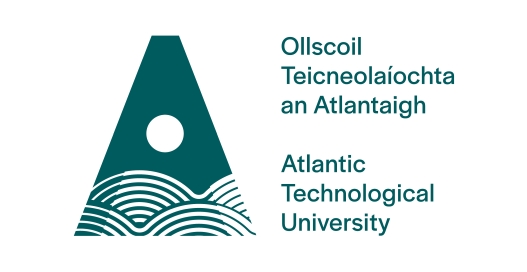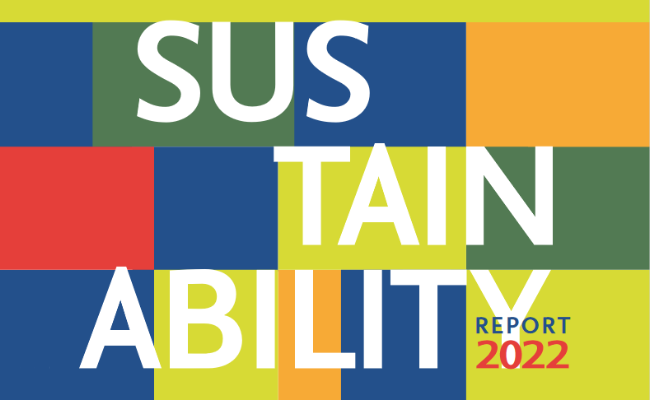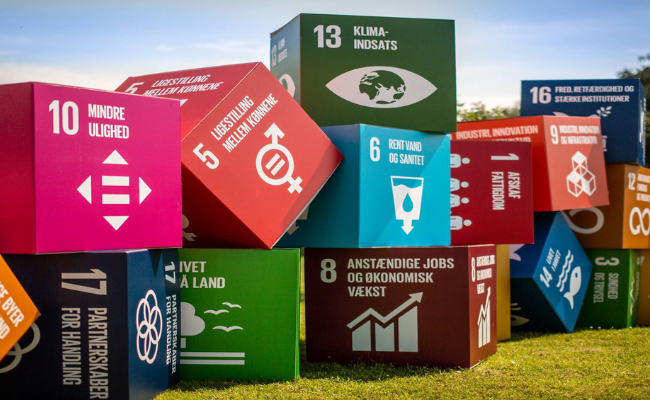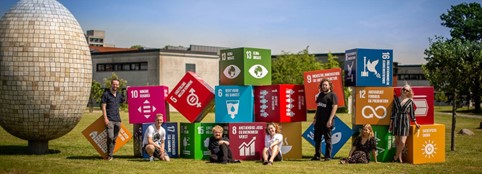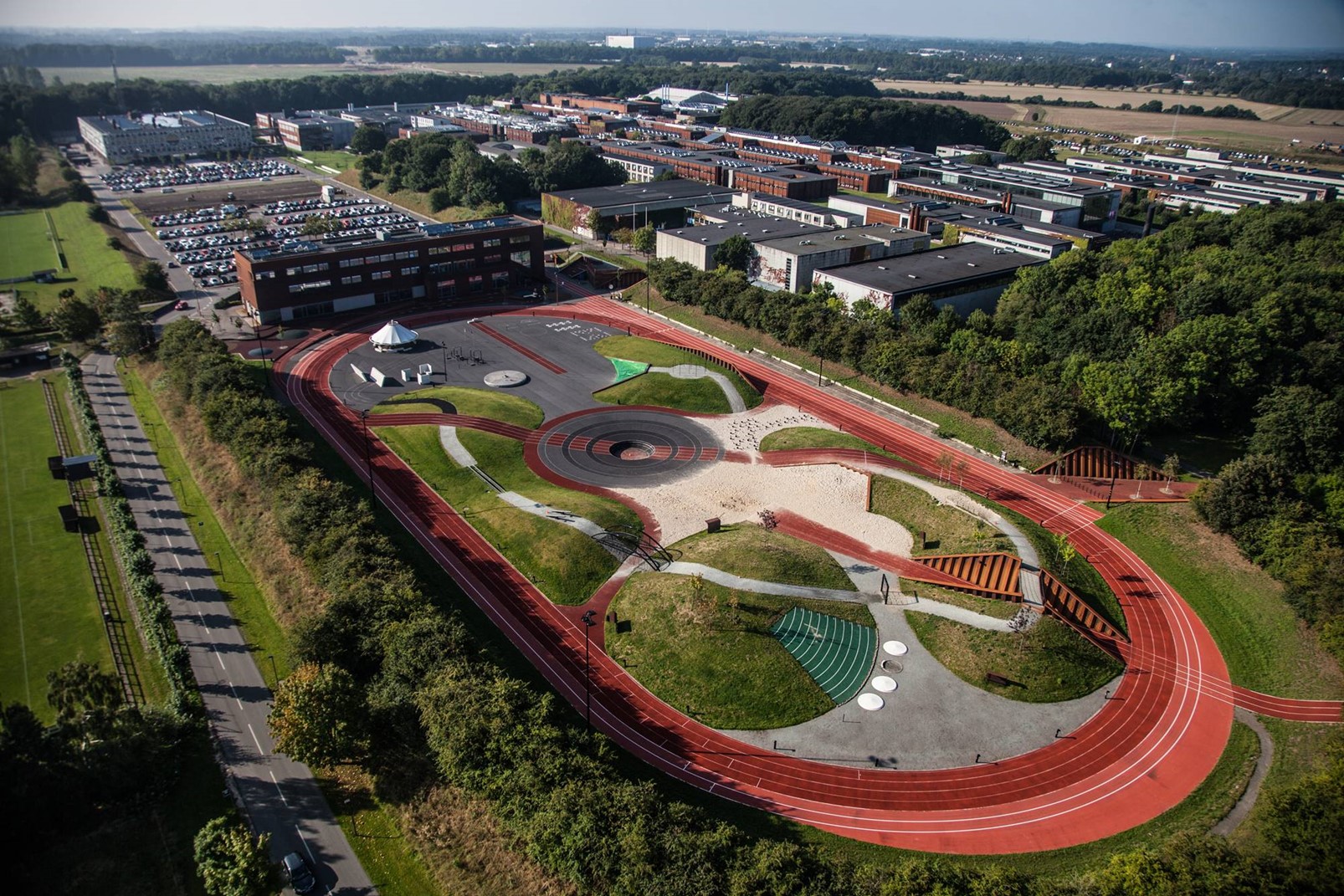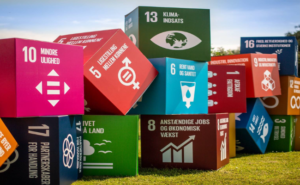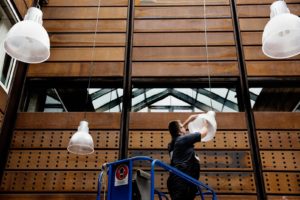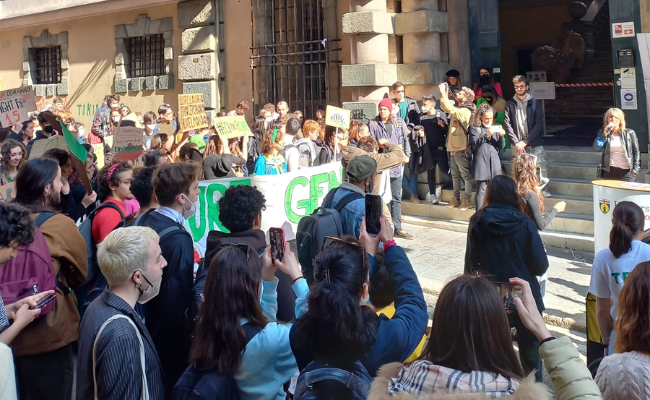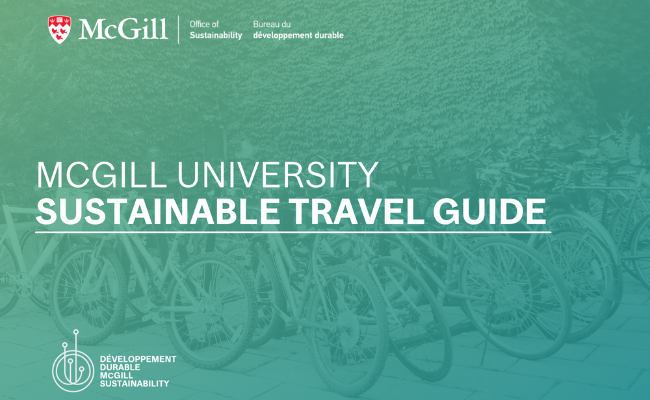McGill launches new Sustainable Labs Guide to help researchers implement greener practices
Online resource suggests actionable steps to improve water and energy conservation, procurement, waste management, and more.
At a research-intensive university like McGill, laboratories play a critical role both in advancing solutions for a sustainable future and making its campuses environmentally responsible places to study and work. In fact, McGill cannot hope to reach its goals of becoming zero-waste by 2035 and achieving carbon neutrality by 2040 without collaboration from the faculty, staff, and students who use these spaces. This is why the University released an updated version of its Sustainable Labs Guide to support lab users interested in adopting more sustainable practices.
"We hope the guide will become a go-to resource for lab users at McGill, whether they are new to sustainability or looking for ideas and support as they take their green lab habits to the next level,” says Sustainability Officer Kimberly John, who joined the Office of Sustainability in 2022 to lead the development of a Sustainable Labs Certification program.
Divided into eight categories ranging from green chemistry to animal research, the Sustainable Labs Guide suggests roughly 75 actions that lab users can implement to make their operations more sustainable. These tips will be continually updated based on feedback from the McGill community and as the University implements more sustainable lab initiatives in areas such as waste management and energy conservation.
“This new version of the Sustainable Labs Guide brings together the most up-to-date information and resources that lab users need to know in order to make their operations more sustainable, without compromising the quality of their research or the safety of their labs,” says George Lazaris, Director of the McGill Department of Buildings and Grounds, one of the units that helped develop the guide.
In addition to reducing the negative environmental impacts of research, the suggested actions and additional resources provided in the Sustainable Labs Guide can help lab users promote health and safety practices, as well as utilize their supplies, equipment, and funding more efficiently.
A collective push toward greener labs
The actions outlined in the updated guide were developed by the Sustainable Labs Working Group, which was established in 2014 to bring together members of the McGill community looking to incorporate sustainability into the operation and design of labs. The working group includes people from the Office of the Vice-Principal of Research and Innovation, Procurement Services, McGill’s Green Labs Initiative, Facilities Management and Ancillary Services, and others.
“This guide is the result of a collaborative effort between key stakeholders at McGill, including staff, students, and researchers,” says Christian Bouchard, who manages McGill’s Hazardous Waste Management unit and co-authored the first edition of the guide back in 2017.
“We want to provide a tool for researchers where they can find several different ways to improve the sustainability of their lab with minimal effort, all in one place, and without distracting from the main goals of scientific research, which is to make breakthrough discoveries using the best tools available and to minimize the factors that affect the consistency of results.”
To help your lab implement more sustainable practices, consult the Sustainable Labs Guide.
Photo by Siddhi Aubeeluck.
Job ad: Associate Director for Outreach and Advancement - UPenn
Overview: Reporting to the Senior Director, the Associate Director for Outreach and Advancement is responsible for developing and delivering on a set of outputs designed to enhance the visibility of the Initiative, elevate Penn’s collective impact, and position the Initiative to grow through partnerships and fundraising. The Initiative’s team is highly collaborative, so this work provides ample opportunity to lead and to share work.
Location: University of Pennsylvania, Philadelphia, Pennsylvania; Hybrid Eligible - This position is eligible for a hybrid work schedule with a work week divided between working onsite and working remotely.
Reporting To: Melissa Brown Goodall, Senior Director, Environmental Innovations Initiative
More information: Opportunities | UPenn Environmental Innovations Initiative
Climate neutrality for universities: invitation to share
Eddi Omrcen, sustainability strategist at University of Gothenburg, is assisting with a student masters thesis project in collaboration with the university’s Environmental Management team.
The goal of the thesis project is to investigate and evaluate opportunities for the University of Gothenburg to become climate neutral, as well as consequences and repercussions that may follow.
- What are the implications for University of Gothenburg if it were to attain climate neutrality?
- What challenges and outcomes would there be for the University of Gothenburg?
The project includes a benchmarking exercise to identify and learn from other universities that are struggling with the same challenge and that have initiated work or processes to become climate neutral.
The results from the thesis will be shared amongst the participating universities and in the ISCN network.
If you are interested to participate and exchange experiences, please email Eddi Omrcen [email protected] with:
- Information and/or documents on your climate targets and ambitions.
- A contact person at your university that is responsible for the process.
Job ad: Data Engineer - MIT
Location: Massachusetts Institute of Technology, Cambridge, Massachusetts
Reporting To: Director of Sustainability, Julie Newman
Hours: Full time, 40 hours
Schedule: Hybrid office/remote
Position overview: The Data Engineer is responsible for updating and building the data architecture needed to track and report out on all campus sustainability activities, prioritizing the climate mitigation and resiliency, waste and food goals outlined in Fast Forward: MIT’s Climate Action Plan for the Decade. More specifically, this position will initially be responsible for formalizing the data acquisition and analytical structure, policies and procedures. This individual will curate and organize data from multiple sources and upload for access on the Sustainability Data Pool, a first of its kind centralized data repository available to all members of the MIT community. The time periods and units of measurement of the data will be topic and data dependent.
More information: MIT - Data Engineer - Cambridge MA 02139 (peopleclick.com)
EPFLeaders4impact – A new postdoctoral fellowship programme for the next generation of sustainable science leaders
3rd call for the EPFLeaders4impact programme (deadline 1 March 2023) providing grants to postdoctoral researchers working on innovative solutions to global challenges.
EPFLeaders4impact is a new postdoctoral fellowship programme funding talented researchers who have the ambition to provide innovative solutions to the United Nations Sustainable Development Goals.
EPFLeaders4impact fellows will be able to take steps towards starting a company based on their own research or to have their proposed innovative solution implemented through a technology transfer to an existing company/organisation.
EPFLeaders4impact has received funding from the European Union’s Horizon 2020 research and innovation programme under the Marie Skłodowska-Curie grant agreement No 101034260.
What: 12, 18, 24, or 36-month postdoctoral fellowships. The EPFLeaders4impact fellowship consists of a monthly contribution to the salary of the postdoctoral researcher of EUR 2’740. The remaining part of the salary as well as associated costs are covered by the EPFL hosting laboratory.
Where: research funded by the EPFLeaders4impact programme must be conducted at one of the EPFL campuses in Lausanne, Geneva, Neuchâtel, Valais, or Fribourg.
Eligibility:
- Applicants must be Experienced Researchers (ER); they must hold a doctoral degree or have at least 4 years of full-time equivalent research experience by at the latest the date of recruitment.
- Applicants must fulfil the MSCA transnational mobility rules and must not have resided or carried out their main activity (work, studies, etc.) in Switzerland for more than 12 months in the 3 years immediately before the call deadline.
- Applicants must be able to carry out full-time research during the fellowship period. Parental leave, sick leave, care leave, and military leave are nevertheless permitted.
Application deadline: 1 March 2023 (17:00 CEST)
Start of the fellowship: at the earliest: 1 July 2023, at the latest: 1 November 2023
Current fellows and their projects: here
More details: please, visit the EPFLeaders4impact website
Contact: [email protected]
Job ad: Research Assistant - ATU Galway-Mayo Centre for Sustainability
Closing Date: 12 noon on Friday, 18 November 2022.
Location: ATU Galway-Mayo Galway City (Wellpark Road) and Connemara campuses.
Reporting To: Dr Mark Kelly, Head of ATU Galway-Mayo Centre for Sustainability
Duration: The position will be for a period of 12 months. The successful candidate would be expected to start as soon as possible after receiving an offer.
Project Title: The Design and Development of a Circular Campus Framework for the Atlantic Technological University (ATU).
Job Description:
Context
The ATU Galway-Mayo Centre for Sustainability aims to embed sustainability and the Sustainable Development Goals (SDGs) as core guiding principles in all activities in ATU with a particular focus on curriculum, campus, community, collaborative research, and culture. This project will specifically focus on the design and development of a circular campus framework for the ATU School of Design and Creative Arts based at the ATU Galway City (Wellpark Road) and Connemara campuses. This will consist of the following elements:
- Horizon scan and systematic literature review of circular economy implementation and integration into organizations with a narrowing of the focus to best practice examples in public sector organizations and higher education institutions internationally.
- Review and analysis of the current situation in relation to the Irish higher education sector’s commitment to climate action and
- Questionnaire survey and interviews with staff and students to identify circular economy awareness, knowledge, and
- Explore and identify synergies with the National Green Campus Programme, the Sustainability Tracking, Assessment & Rating System™ (STARS) process, and the development of an ATU Sustainability and Climate Action
- Explore and identify opportunities to embed circular economy principles into a living lab concept to frame campus operations and management e.g., new builds, refurbishment, and maintenance works in collaboration with the Build360 research group in the ATU Galway-Mayo Department of Building and Civil Engineering and ATU Galway-Mayo Building and Estates Office; and a Materials Flow Analysis to benchmark inflows, stock, and
- Explore and identify opportunities to embed circular economy principles into the curriculum e.g., content, assessment, pedagogy
- Explore and identify opportunities to utilize the circular economy as a means of community engagement i.e., with social enterprises, businesses, schools/further education/lifelong learning etc, within a circular neighbourhood/community
- Identify, prepare, and submit research funding applications based around the circular campus concept to build institutional capacity in this
The successful candidate will report to the Head of ATU Galway-Mayo Centre for Sustainability, Dr. Mark Kelly, the Head of School of Design and Creative Arts, Dr. Patrick Tobin, and Dr. Dermot O’Donovan, the Head of Department of Creative Education.
Requirements:
Minimum:
- Fluency in English and excellent written and oral presentation
- The post will require a researcher to have a minimum of a primary honour’s degree in a relevant
Desirable:
- Postgraduate degree in a relevant
- Relevant industrial and/or research
- Demonstrate a good knowledge and understanding of the circular economy and the higher education sector sustainability
- Strong level of technical aptitude and problem-solving
- The potential candidate should be self-motivated with an aptitude for creative problem-solving, along with the flexibility to adapt to new tools and
- Excellent interpersonal, communication and organizational
- Ability to present results/methods in written and oral form to internal and external
- Willingness and ability to work in a fast-paced and dynamic
- Able to work independently as a self-starter and as part of the wider project
- Capable of directing and interfacing with the work of collaborators (including at remote locations).
- Ability to build and document knowledge and share information about latest methods, trends, and developments in the relevant field of
- Ability to manage development aspects of the project according to aligned project briefs.
- Proficient in documentation, presentation, and project management
- Proficient in the preparation of research funding
Salary Scale: Research Assistant Point 1 on the IUA Scale €27,109.00 per annum plus 20% pension contribution.
Hours of Work: 39 Hours per week
Annual Leave: 22 days annual leave per annum
Further information on the position may be obtained from Dr Mark Kelly ([email protected]).
Freie Universität Berlin publish Sustainability Report 2022
The third Sustainability Report summarizes the status of achievements in the area of sustainability and climate protection at Freie Universität Berlin. The university is presenting the report for the third time since 2018. The publication focuses in particular on the years 2020 and 2021 and reviews activities in the fields of governance, teaching and research, campus, dialogue, and networks. In addition, the report provides an outlook on the university's future sustainability priorities.
In 2020 and 2021, Freie Universität reached important milestones: in September 2021, it was validated by an external environmental auditor according to the European environmental management system EMAS. EMAS (Eco-Management and Audit Scheme) is the European Union's environmental management certification and is one of the most demanding management standards worldwide. Freie Universität is one of a small group of currently 24 EMAS-validated universities in Germany. It thus has an essential prerequisite for developing its environmental management transparently and continuously. The validation was only possible through the intensive participation of large parts of the university.
Another milestone in the past two years was the launch of a new ideas and innovation management program aimed at implementing the commitments defined in the 2019 Climate Emergency Declaration. It had a promising start with the first call for proposals - FUturist - in November 2021 and 28 proposals submitted.
"We now have the opportunity here for new initiatives, narratives and communities to emerge, which in the best case will inspire each other and spark ideas for new living labs," says Andreas Wanke, head of the Sustainability and Energy Unit.
A sustainability-oriented business travel policy with CO2 pricing and a dedicated climate protection budget was also launched. The 2020 and 2021 mission statement for studying and teaching highlights sustainability as one of eight guiding dimensions. The Blooming Campus initiative has brought about changes in the university's green space management. Meadows and green spaces on campus have been mowed significantly less since 2020. Mowing has ceased during the early bloom phase in April. Species diversity on campus has increased significantly since then.
Freie Universität began systematically implementing climate protection more than 20 years ago. With a bundle of different measures and incentives, the university has succeeded in reducing campus-related electricity and heat consumption by a total of almost 27 percent between 2001 and 2019. Adjusted for the increase in space, the reduction is as much as 29 percent. In the pandemic years of 2020 and 2021, energy use decreased by another 4.7 percent (2021), for an overall decrease of 30 percent since 2001. Adjusted for area, it is even a reduction of 34 percent.
Andreas Wanke notes: "The decline in energy consumption and emissions due to the increased use of home offices during the pandemic years fell short of expectations. This was due in particular to the fact that many heating systems, ventilation systems and devices had to remain in operation despite largely virtual semester operation. In addition, the increased need for ventilation during the pandemic also resulted in increased energy consumption."
In 2019, Freie Universität became the first German university to declare a climate emergency, with a commitment to consider climate impacts in all decisions and planning and to become climate neutral by 2025. For the next few years, the focus will be on measures to implement the climate emergency declaration. These include, for example, the addition of photovoltaic systems and the further reduction of energy consumption through energy efficiency measures. These processes will decisively shape sustainability management at Freie Universität over the next three years.
University of Southern Denmark 2021 Sustainability Report released
Knowledge for a sustainable future
Universities have a critical role to play in providing answers to grand societal challenges. In our time, one of the greatest challenges facing the future of our planet is sustainable development. Universities generate new knowledge and innovations that provide solutions to the interconnected social, economic and environmental challenges captured in the SDGs. This report is a snapshot of what we did in 2021 to advance sustainability across the University of Southern Denmark.
Research and innovation
The report shows that researchers at SDU are occupied with sustainability and are engaged in a wide variety of sustainability-related research activities. The examples range from green aviation fuel to inequality in healthcare and sustainable markets. The report also shows that the activities are happening globally and locally in collaboration with other universities, companies and public institutions.
On average, between 2019 and 2020, 58% of research funding was used for research related to sustainability. This corresponds to almost DKK 400 million. According to Elsevier SDG classification queries in the database Scopus1, the total number of SDG-related publications by SDU researchers in any SDG in 2021 was 1,906. 1,309 of these were scholarly SDG-related publications (articles, conference papers and book chapters).
From 2011-2020, researchers from SDU published around 25,000 co-authored publications. 15% of these were with non-SDU researchers from the Global South. During that period, there was a yearly increase in the number of co-authored publications and the proportion published in cooperation with non-SDU researchers from the Global South. In 2020, this share was 20%.
Finding effective solutions to the climate challenges facing society requires interdisciplinary research. SDU holds a strong position within this area, and we want to bring this even more into play. In 2022, we will launch SDU Climate Cluster (SCC). SCC will unite research environments across disciplines and faculties on a joint, mission-driven research thematic: “Climate”. With a broad interdisciplinary approach to climate research, SCC will set a framework that provides optimal conditions for cutting-edge, excellent and interdisciplinary research, education and communication within the climate area and the sustainable green transition of society.
Teaching and learning
Of the 17 SDGs, SDG 4 is Quality Education, which discusses the need to ensure inclusive and equitable quality education for all without discrimination. SDG 4 has 10 targets concerning different aspects of education. One of the targets focuses on ensuring that all learners acquire the knowledge and skills needed to promote sustainable development. In the autumn semester of 2020, as a part of a pilot project around 1,000 students across SDU completed the introductory course on sustainability. In 2021, the course became part of all programmes at SDU, and all new students on the bachelor programmes must now complete the course.
The report sheds light on the range of subjects and courses as well as co- and extracurricular offers relevant to sustainability. 995 courses and subjects offered were related to sustainability. This corresponds to 23% of all courses and subjects. 89 bachelor, master’s and engineering programmes are related to the green transition. This means that the programmes contain topics such as energy production and efficiency, agriculture and food production, transport, environment and circular economy, nature and biodiversity or sustainable behaviour and societal consequences.
In 2022, we will continue to develop and make visible our curricular, extra- and co-curricular offers to students who want to improve their skills in relation to sustainability. Another area of focus will be rethinking our guidance to students. We are now standing on the threshold of a new transition in the labour market: the sustainable transition. At the same time, we are experiencing that more students want to contribute to a sustainable future through participation in communities. The task here will be to support students and see to it that their individual career trajectory is connected to the societal and global trajectory, and that “I too” through my education, work and career can contribute to the actual creation of a sustainable future.
Operations
SDU is also committed to embedding sustainability in all our campus operations to conserve resources, reduce pollution, reduce carbon emissions and support positive behaviour on sustainable issues. We also want to ensure that SDU is a diverse employer with innovative and creative research environments and an inclusive and healthy working environment.
The also shed light on selected areas in our efforts to make our campuses more sustainable and make SDU an inclusive and diverse workplace characterised by a healthy working environment. As can be seen about one in five employees experience challenges in relation to their work-life balance. When a similar survey was conducted three years ago in 2018, this share was also 21%.
In relation to gender equality, it should be noted that we are seeing a five per cent increase in the proportion of female senior academic staff compared to previous years. The female proportion of senior academics is now 28%. In comparison, the female proportion among assistant professors and associate professors is about 45%. 37% of all managers in SDU are women. If we zoom in on the two senior management levels (executive board members, department heads and directors), the proportion of women is 33%.
With the Board’s adoption of a climate plan for SDU in December 2021, the focus in 2022 and onwards will be on intensifying the work of reducing greenhouse gas emissions from the University. The goals here will be to reduce emissions from buildings, operations and transport as well as strengthen the circular resource economy at SDU. As part of the plan, SDU has set a goal of reducing greenhouse gas emissions by 57% in 2030 compared to 2018.
University of Genoa approves Climate Neutrality Strategy and updates ISCN membership
On January 27, 2022 the University of Genoa (UniGe) made a strong and explicit pledge against climate change, defining its Climate Neutrality Strategy 2022-2030. The strategy, starting from the latest UniGe greenhouse gas (GHG) inventory, outlines a path that the university has to follow to reduce both the direct and indirect emissions of pollutants in the atmosphere. Moreover, the document defines the actions to do for the neutralization or compensation of residual emissions. This is the last step of the strong and continuous commitment towards the spreading of the Sustainability culture in all the activities of the University of Genoa. The 2021-2026 UniGe Strategic Plan also identifies sustainability as one of the five strategic development lines together with digitization and innovation, inclusion, internationalization, and quality.
In 2011, UniGe started its sustainability commitment by focusing the research and projects of the Savona Campus on Sustainable Energy and Smart City. Great efforts were made to reduce the carbon footprint of the Campus by the creation of two big Research Infrastructures (a Smart Microgrid and an energy self-sufficient building) integrating different renewable energy sources and system automation. For those reasons, in November 2016 the Savona Campus joined ISCN sharing its best practices with other international universities. In the meantime, the UniGe Commission on Environmental Sustainability was created to improve the sustainability culture of the whole university. Several actions and projects have been carried out so far, including participation in Italian and international networks or rankings.
“The University of Genoa has made a lot of efforts to improve its sustainability performances in all its campuses. I think that participation in networks, rankings and conferences stimulates us to consider aspects related to sustainability in a systematic and continuous way, enriching our knowledge. For that reason, I decided to sign the ISCN charter on behalf of the whole University of Genoa.” -- Prorector for Sustainability, Adriana Del Borghi
McGill University releases Sustainable Travel Guide
McGill University has released a new Sustainable Travel Guide to provide guidance for McGill travellers—students, staff, and faculty—on how to factor sustainability into travel decisions, from determining whether travel is necessary, to choosing the best mode of transport or reducing impact upon arrival. It was produced by the McGill Office of Sustainability, in Montreal, Canada, with the expertise of its Climate Officer Divya Sharma.
Travelling sustainably means considering present and future environmental, social, and economic impacts of travel. By reducing emissions of business-related travel, McGill community members contribute to the University’s long-term target to achieve carbon neutrality (net zero emissions) by 2040.
The Sustainable Travel Guide, designed as a checklist, guides readers through four questions that push them to think about how they choose to travel:
- Do I need to travel?
- Can I travel sustainably?
- Can I choose sustainable accommodations?
- Can I reduce my environmental impact further?
Throughout, the guide presents various options depending on the traveller’s needs, whether they are travelling locally or internationally, if they are able to bundle trips or reduce the number of travellers, and more.
Learn more at mcgill.ca/sustainability
